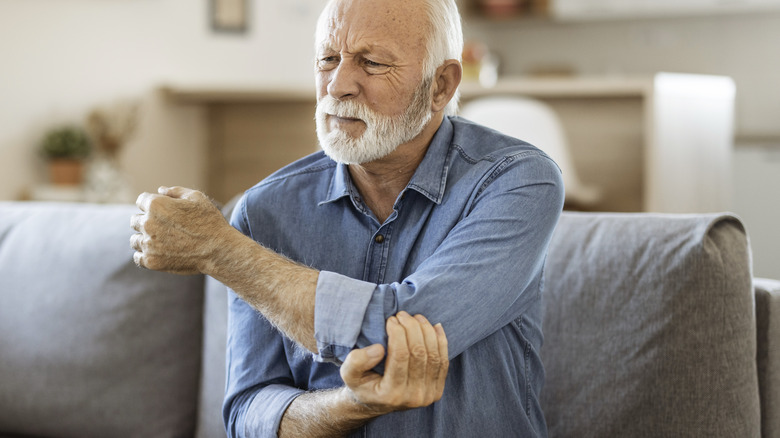What Happens To Your Bones If You Don't Eat Enough Protein
There's no doubt that protein is an essential macronutrient for the body. It supports tissue repair, digestion, and hormone balance, and is fundamental to the health of our skin, muscles, hair, bones, and more (via Piedmont Health).
While dietary needs are individual to each person, the U.S. Food and Drug Administration (FDA) recommends an average daily intake of 50 grams of protein. A 2011 study published in the International Journal for Vitamin and Nutrition Research notes a link between consuming greater amounts of protein and increased bone mineral density. Bone mineral density pertains to the amount of calcium and other essential nutrients that can be found in the makeup of one's bones, explains the Cleveland Clinic. Having a healthy bone mineral density can reduce one's risk of fractures, which some people become more susceptible to as they grow older.
If getting ample protein can help build bones, then what happens to our bones if we're lacking in protein?
How a lack of protein impacts our bones in childhood and adulthood
Not getting enough protein can impact our bones throughout childhood as well as adulthood. According to experts at the International Osteoporosis Foundation, inadequate protein consumption during childhood inhibits the release and functioning of a hormone known as Insulin-like Growth Factor (IGF-1). IGF-1 helps the body better absorb calcium and phosphate, two minerals that are essential to our bone health. Therefore, a lack of protein in one's diet during childhood can hinder proper bone development.
Our bones routinely undergo a cycle of formation and destruction during our lifetime (via the Cleveland Clinic). As we progress into older adulthood, however, what happens to our bones is that this cycle of deterioration and renewal can become imbalanced, and bone destruction may occur more rapidly than bone development. Elderly individuals who do not get enough protein on a regular basis are therefore more susceptible to bone breakages and a condition known as osteoporosis.
Osteoporosis and protein deficiency
A person develops osteoporosis when bones lose their strength and become porous, explains the Cleveland Clinic. Per the previously mentioned 2011 study, hip-fracture patients are often found to consume lesser amounts of protein. Similarly, in an alternate 2019 systematic review, the research team examined bone health in older adults who ate varying amounts of protein. The findings revealed that participants who ate more protein stood at an 11% lower risk of hip fractures and had greater bone mineral density in the hip region compared to those who ate less protein. The researchers concluded that consuming greater amounts of protein that exceed the recommended daily intake may have protective properties against fractures and bone mineral density loss in older adults.
Some people may get so little protein in their diet that they develop a protein deficiency in the long run. Those with the condition may experience muscle weakness, stress fractures, or notice their hair and nails becoming more brittle, reports UCLA Health. To help ensure you're getting enough protein in your diet, prioritize quality food items like poultry, eggs, and dairy. Don't forget about plant-based protein sources either, such as quinoa, buckwheat, and soy.



